Ground Source Heat Pump at Nowty Towers
-
Bugtownboy
- Posts: 1041
- Joined: Tue Jun 01, 2021 12:35 pm
Re: Ground Source Heat Pump at Nowty Towers
Would that be a bit similar to this Joe 
Re: Ground Source Heat Pump at Nowty Towers
That's the puppy!
15kW PV SE, VI, HM, EN
42kWh LFPO4 storage
73kWh V2H EV
7kW ASHP
200ltr HWT.
3G
Deep insulation, air leak ct'd home
WBSx2
Low energy bulbs
Veg patches & fruit
42kWh LFPO4 storage
73kWh V2H EV
7kW ASHP
200ltr HWT.
3G
Deep insulation, air leak ct'd home
WBSx2
Low energy bulbs
Veg patches & fruit
-
Bugtownboy
- Posts: 1041
- Joined: Tue Jun 01, 2021 12:35 pm
Re: Ground Source Heat Pump at Nowty Towers
Going off topic, but what the hell eh, 
Back in the 90's when I did my Skydiving training we used to have a saying, "I love the smell of jet fuel in the morning", just at the time we were queuing up to board the Twin Otter aircraft and stood behind the exhaust of the Turboprop engines.

I did nearly 30 jumps and became qualified but gave it up quickly as the stress of leaving the aircraft on the last jump was as bad as the first.
This is my favourite photo of myself and I often look at it if I am having a bad day, "don't worry, as your situation could be much worse".

Back in the 90's when I did my Skydiving training we used to have a saying, "I love the smell of jet fuel in the morning", just at the time we were queuing up to board the Twin Otter aircraft and stood behind the exhaust of the Turboprop engines.

I did nearly 30 jumps and became qualified but gave it up quickly as the stress of leaving the aircraft on the last jump was as bad as the first.
This is my favourite photo of myself and I often look at it if I am having a bad day, "don't worry, as your situation could be much worse".

Last edited by nowty on Mon Jan 03, 2022 5:23 pm, edited 5 times in total.
19.6kW PV > 114MWh generated
Ripple 6.6kW Wind + 4.5kW PV > 34MWh generated
7 Other RE Coop's
105kWh EV storage
90kWh Home battery storage
40kWh Thermal storage
GSHP + A2A HP's
Rain water use > 530 m3
Ripple 6.6kW Wind + 4.5kW PV > 34MWh generated
7 Other RE Coop's
105kWh EV storage
90kWh Home battery storage
40kWh Thermal storage
GSHP + A2A HP's
Rain water use > 530 m3
Re: Ground Source Heat Pump at Nowty Towers
Anyway, back to the boring stuff, 
The next stage was done before my pressure testing of the cold circuit, sorry to get this out of order but I am going off a collection of my own notes.
The plumbing of the cold circuit (ground loop) included, full bore isolation valves, a small stainless steel expansion vessel, an air bleed valve and filling point with pressure gauge. I made an improvised fitting to connect a simple cheap pressure sprayer to pressure test the cold circuit.
Now I looked up quite a bit of data from various sources about flow rates and pressure drops using different sized pipes. It all gets quite complicated, but the relevant facts I came up with are,
Water velocities in copper pipe (general for heating systems) should be between 0.5 m/s (below which any suspended matter may settle out) and 2 m/s (above which erosion corrosion damage may occur). Also the heat carrying capacity of a pipe is limited by the maximum velocity that can be accepted for noise reasons and this is generally taken as 1.5 m/s. Also a high flow is recommended for ground loops in order to induce as much turbulence as possible to improve the heat transfer.
For a 1.5 m/s flow rate and a 5 degree temp drop, the heat carrying capacity of the main 22mm flow and return pipe is around 10 kW and a flow rate per hour of about 2000 litres per hour, both which exceed the design specs of the heatpump, so looked OK.
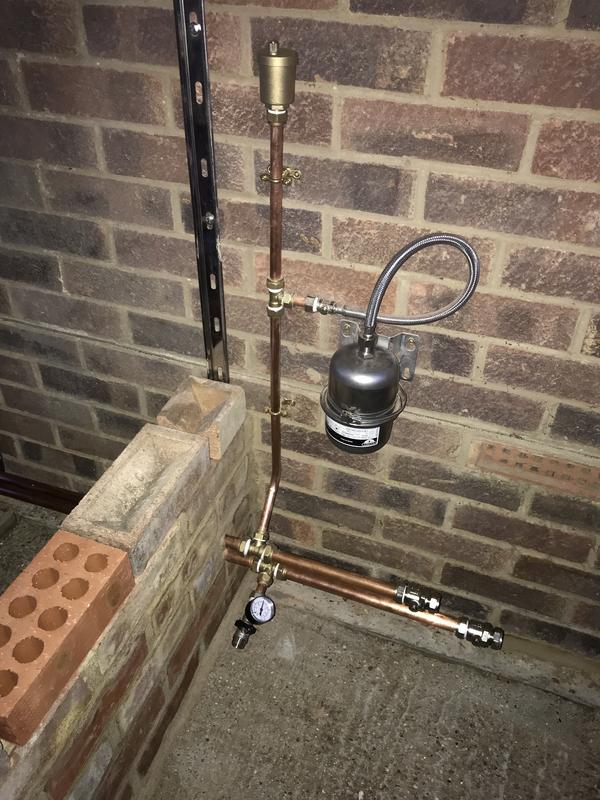
The next stage was done before my pressure testing of the cold circuit, sorry to get this out of order but I am going off a collection of my own notes.
The plumbing of the cold circuit (ground loop) included, full bore isolation valves, a small stainless steel expansion vessel, an air bleed valve and filling point with pressure gauge. I made an improvised fitting to connect a simple cheap pressure sprayer to pressure test the cold circuit.
Now I looked up quite a bit of data from various sources about flow rates and pressure drops using different sized pipes. It all gets quite complicated, but the relevant facts I came up with are,
Water velocities in copper pipe (general for heating systems) should be between 0.5 m/s (below which any suspended matter may settle out) and 2 m/s (above which erosion corrosion damage may occur). Also the heat carrying capacity of a pipe is limited by the maximum velocity that can be accepted for noise reasons and this is generally taken as 1.5 m/s. Also a high flow is recommended for ground loops in order to induce as much turbulence as possible to improve the heat transfer.
For a 1.5 m/s flow rate and a 5 degree temp drop, the heat carrying capacity of the main 22mm flow and return pipe is around 10 kW and a flow rate per hour of about 2000 litres per hour, both which exceed the design specs of the heatpump, so looked OK.

19.6kW PV > 114MWh generated
Ripple 6.6kW Wind + 4.5kW PV > 34MWh generated
7 Other RE Coop's
105kWh EV storage
90kWh Home battery storage
40kWh Thermal storage
GSHP + A2A HP's
Rain water use > 530 m3
Ripple 6.6kW Wind + 4.5kW PV > 34MWh generated
7 Other RE Coop's
105kWh EV storage
90kWh Home battery storage
40kWh Thermal storage
GSHP + A2A HP's
Rain water use > 530 m3
-
AE-NMidlands
- Posts: 2288
- Joined: Wed Jun 02, 2021 6:10 pm
Re: Ground Source Heat Pump at Nowty Towers
A friend convinced me to change to endfeed fittings: he said "If you can do a Yorkshire joint you can do endfeed, save a lot of money and space!"Joeboy wrote: ↑Sun Nov 28, 2021 12:29 pmSame here. Love a Yorkshire fitting and the smell of flux in the morning!spread-tee wrote: ↑Sun Nov 28, 2021 9:03 am Fittings are pretty variable in quality that's for sure, personally I solder all copper work,I only use compression if I cant use poly plumb or the pipework wont drain out enough for a solder joint.
Desp
I did and it has been OK. I was really surprised that when I disassembled one Yorkshire joint the inner end hadn't wetted / soldered the pipe at all, despite me being almost obsessive about cleaning both surfaces.
I have tried the "no need to clean" solder but didn't like it: it cleaned the copper perfectly but I couldn't assemble the joints. I put it down to the metal being so clean that it fused on first contact. I like the lubrication that you get with old-fashioned flux.
A
2.0 kW/4.62 MWh pa in Ripples, 4.5 kWp W-facing pv, 9.5 kWh Givenergy batt
30 solar thermal tubes, 2MWh pa in Stockport, plus Congleton and Kinlochbervie Hydros,
Most travel by bike, walking or bus/train. Veg, fruit - and Bees!
30 solar thermal tubes, 2MWh pa in Stockport, plus Congleton and Kinlochbervie Hydros,
Most travel by bike, walking or bus/train. Veg, fruit - and Bees!
-
Oliver90owner
- Posts: 435
- Joined: Wed Jun 16, 2021 3:48 pm
Re: Ground Source Heat Pump at Nowty Towers
Going off topic, but what the hell eh, 
It would be better(?) If other comments were posted on a different thread? It would make this most useful thread easier to follow if there were no interruptions to the flow. Personally, I’m very much enjoying the write-up - just not the bits that are ‘diluting’ it.
It would be better(?) If other comments were posted on a different thread? It would make this most useful thread easier to follow if there were no interruptions to the flow. Personally, I’m very much enjoying the write-up - just not the bits that are ‘diluting’ it.
Re: Ground Source Heat Pump at Nowty Towers
What a fun night out you must be pal.Oliver90owner wrote: ↑Sun Nov 28, 2021 3:07 pm Going off topic, but what the hell eh,
It would be better(?) If other comments were posted on a different thread? It would make this most useful thread easier to follow if there were no interruptions to the flow. Personally, I’m very much enjoying the write-up - just not the bits that are ‘diluting’ it.
15kW PV SE, VI, HM, EN
42kWh LFPO4 storage
73kWh V2H EV
7kW ASHP
200ltr HWT.
3G
Deep insulation, air leak ct'd home
WBSx2
Low energy bulbs
Veg patches & fruit
42kWh LFPO4 storage
73kWh V2H EV
7kW ASHP
200ltr HWT.
3G
Deep insulation, air leak ct'd home
WBSx2
Low energy bulbs
Veg patches & fruit
Re: Ground Source Heat Pump at Nowty Towers
Then as my heatpump did not come with any built in water pumps, I had to work out what size of water pumps I needed. I found this graph from Yorkshire Pipes,
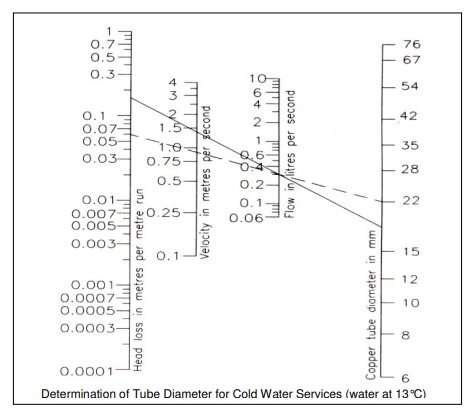
The effective length of the pipe run was quite difficult to work out because of the different diameters of pipe and the numerous 90 degree bends and of course the heat exchanger in the evaporator also had to be added. Then the graph was for water at 13 degrees with no glycol in it. So after some more calculations I came to a pressure head value of 9 metres.
Well I had already bought a couple of standard 6m head pumps (cos their cheap) before even doing the calculations so had to press on trying them out. I tested it with a single pump and I measured a flow rate of 800 litres per hour. I was about to bite the bullet and purchase a more powerful pump but as I had two of the pumps I tried both in series and the flow rate improved to 1,200 litres per hour so decided to go with that.
I measured the flow rate by pumping from one bucket into another and measuring the time taken to fill the bucket.
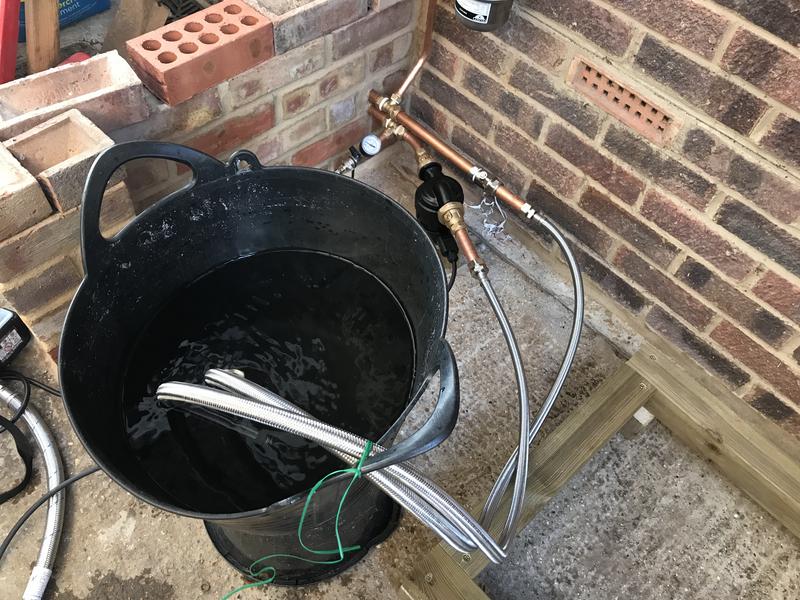

The effective length of the pipe run was quite difficult to work out because of the different diameters of pipe and the numerous 90 degree bends and of course the heat exchanger in the evaporator also had to be added. Then the graph was for water at 13 degrees with no glycol in it. So after some more calculations I came to a pressure head value of 9 metres.
Well I had already bought a couple of standard 6m head pumps (cos their cheap) before even doing the calculations so had to press on trying them out. I tested it with a single pump and I measured a flow rate of 800 litres per hour. I was about to bite the bullet and purchase a more powerful pump but as I had two of the pumps I tried both in series and the flow rate improved to 1,200 litres per hour so decided to go with that.
I measured the flow rate by pumping from one bucket into another and measuring the time taken to fill the bucket.

19.6kW PV > 114MWh generated
Ripple 6.6kW Wind + 4.5kW PV > 34MWh generated
7 Other RE Coop's
105kWh EV storage
90kWh Home battery storage
40kWh Thermal storage
GSHP + A2A HP's
Rain water use > 530 m3
Ripple 6.6kW Wind + 4.5kW PV > 34MWh generated
7 Other RE Coop's
105kWh EV storage
90kWh Home battery storage
40kWh Thermal storage
GSHP + A2A HP's
Rain water use > 530 m3
Re: Ground Source Heat Pump at Nowty Towers
So the actual testing time came, I connected the cold circuit with two water pumps and a couple of full bore flexible connection hoses and gate valves to the pumps for easy replacement. I filled the cold circuit with a 20% mixture of food grade glycol and pressurised it to around 1 bar. The glycol is required to lower the freezing temp of the liquid but it comes with an operational cost. The specific heat capacity of glycol is less than water and it makes the liquid more viscous, especially at low temperatures, so makes the flow rate drop and the pump work harder.
For experimental purposes, I simply connected the hot circuit with a single water pump running into a 35 litre builders bucket filled with water. I placed a thermometer in the bucket so I could measure the temperature over time and I also measured the power input to the heatpump.
I switched on the unit, first it did a system check, then the cold circuit pumps started up, followed a minute later by the hot circuit pumps. Soon after the compressor started up. Almost instantly the gauges on the exterior of the unit move in opposite directions, the evaporator is getting colder under the partial vacuum as the refrigerant gas boils as it turns from a liquid into a gas and the condenser is getting hotter under higher pressure as the refrigerant gas is compressed and turns from a gas back into a liquid thus giving up its latent heat. The hot water output feels slightly warm, with the cold circuit gets colder with condensation forming on the ground loop pipes.
Test setup
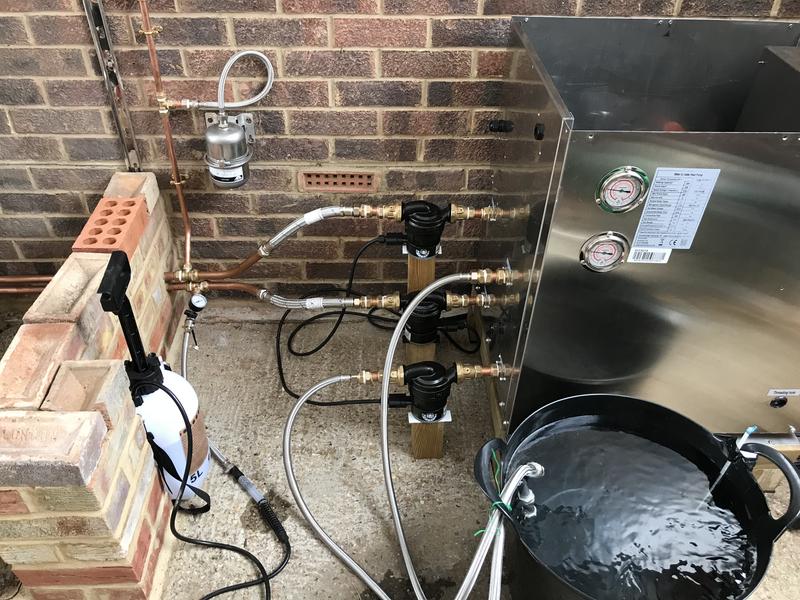
Water temperature is rising
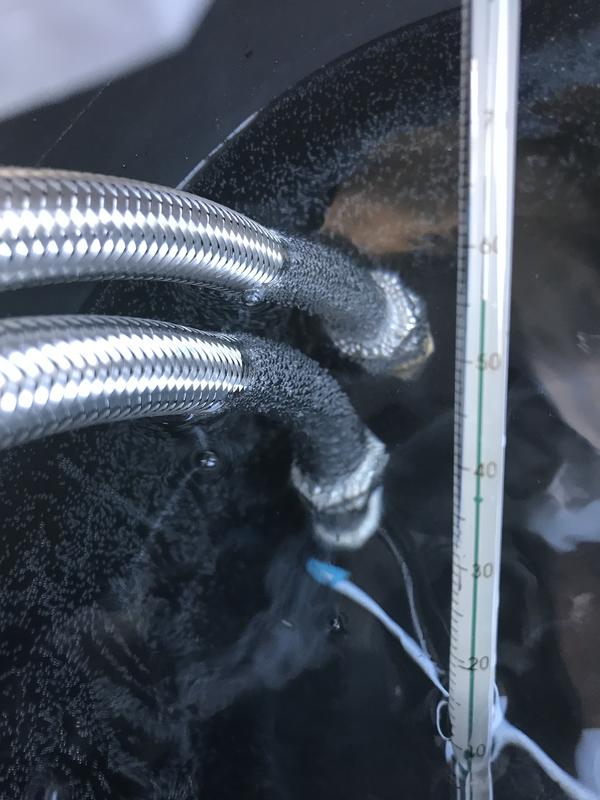
Pressure gauges showing the high pressure condenser (hot) and the low pressure evaporator (cold) temperatures
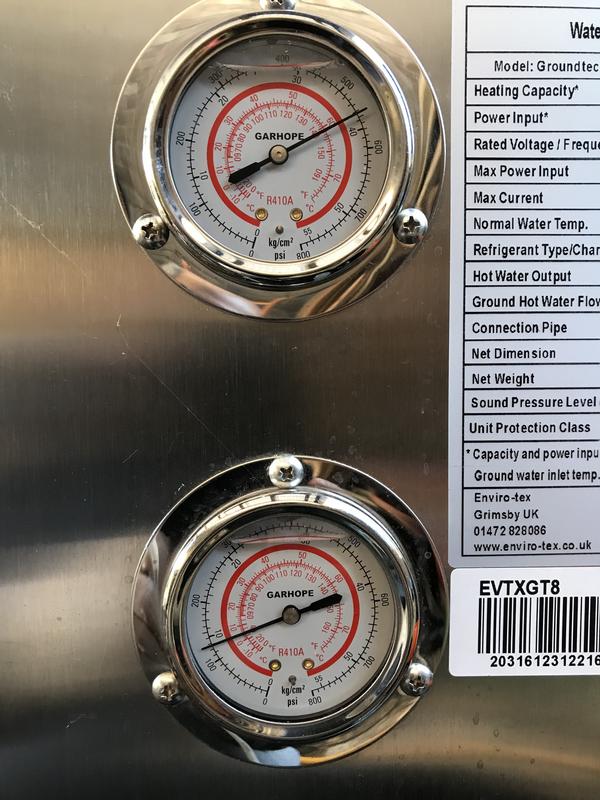
A constant increase of 2 degrees per minute in the 35 litre builders bucket, from 18 degrees all the way up to 58 degrees in 17 mins when the high temperature tripped out the compressor. I have calculated that equates to a constant 5.7kW of heat output. The electricity consumption gradually increases in line with the compressor pressure, thus reducing the COP value. The ground loop rapidly drops in temperature for the first 5 minutes, then becomes constant.
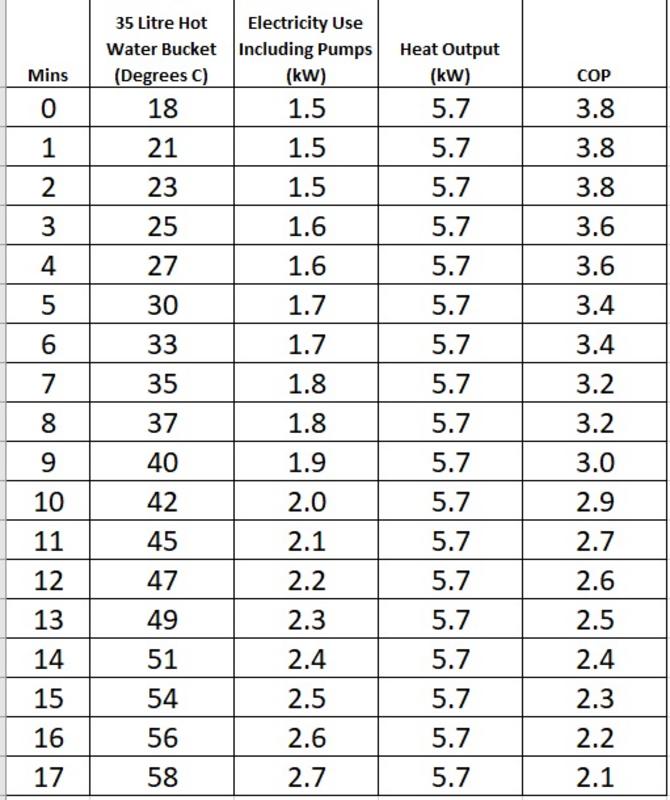
For experimental purposes, I simply connected the hot circuit with a single water pump running into a 35 litre builders bucket filled with water. I placed a thermometer in the bucket so I could measure the temperature over time and I also measured the power input to the heatpump.
I switched on the unit, first it did a system check, then the cold circuit pumps started up, followed a minute later by the hot circuit pumps. Soon after the compressor started up. Almost instantly the gauges on the exterior of the unit move in opposite directions, the evaporator is getting colder under the partial vacuum as the refrigerant gas boils as it turns from a liquid into a gas and the condenser is getting hotter under higher pressure as the refrigerant gas is compressed and turns from a gas back into a liquid thus giving up its latent heat. The hot water output feels slightly warm, with the cold circuit gets colder with condensation forming on the ground loop pipes.
Test setup

Water temperature is rising

Pressure gauges showing the high pressure condenser (hot) and the low pressure evaporator (cold) temperatures

A constant increase of 2 degrees per minute in the 35 litre builders bucket, from 18 degrees all the way up to 58 degrees in 17 mins when the high temperature tripped out the compressor. I have calculated that equates to a constant 5.7kW of heat output. The electricity consumption gradually increases in line with the compressor pressure, thus reducing the COP value. The ground loop rapidly drops in temperature for the first 5 minutes, then becomes constant.

Last edited by nowty on Sun Dec 05, 2021 3:37 pm, edited 1 time in total.
19.6kW PV > 114MWh generated
Ripple 6.6kW Wind + 4.5kW PV > 34MWh generated
7 Other RE Coop's
105kWh EV storage
90kWh Home battery storage
40kWh Thermal storage
GSHP + A2A HP's
Rain water use > 530 m3
Ripple 6.6kW Wind + 4.5kW PV > 34MWh generated
7 Other RE Coop's
105kWh EV storage
90kWh Home battery storage
40kWh Thermal storage
GSHP + A2A HP's
Rain water use > 530 m3